SEPTEMBER 22- TODAY’S READING FROM THE ONE YEAR BIBLE- ISAIAH 39:1- 41:16; EPHESIANS 1:1-23; PSALM 66:1-20; PROVERBS 23:26-28
Today’s readings take us to some of the highest heights of both the Old and New Testaments! Isaiah, the apostle Paul, and the psalmist extol the glories of Christ and what God has accomplished in Him for those who believe.
TODAY’S READING FROM THE OLD TESTAMENT- ISAIAH 39:1- 41:16
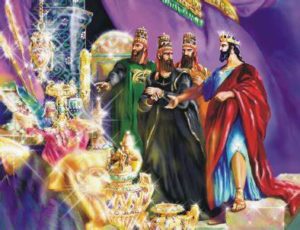 The news of Hezekiah’s illness and recovery spread quickly. In Chapter 39, envoys from the Morodoch Baladan, the son of Baladan, the king of Babylon, bring letters and a gift. Hezekiah foolishly lets his guard down and shows them all the treasures of his house and his realm. His naive transparency gives the Babylonians all the information they will need for spoiling the Judeans when they come to conquer Jerusalem.
The news of Hezekiah’s illness and recovery spread quickly. In Chapter 39, envoys from the Morodoch Baladan, the son of Baladan, the king of Babylon, bring letters and a gift. Hezekiah foolishly lets his guard down and shows them all the treasures of his house and his realm. His naive transparency gives the Babylonians all the information they will need for spoiling the Judeans when they come to conquer Jerusalem.
Hezekiah’s foolishness leads to a great security breach. This is a reminder to us all that we are in a spiritual battle and must remain vigilant.
1 Peter 5:8 8 Be of sober spirit, be on the alert. Your adversary, the devil, prowls around like a roaring lion, seeking someone to devour.
Isaiah reprimands King Hezekiah. He has been deceived through flattery and feigned kindness to show off the glories of his kingdom. Isaiah prophesies the consequence- his treasures would be carried off to Babylon; his own descendants would be taken captive and made eunuchs in the palace of the king of Babylon (39:5-7).
Hezekiah accepts Isaiah’s rebuke. His response is ambiguous. Is it sincere repentance, or does this disclose the depth of his self-absorption? Is he expressing humble acceptance or expressing his relief and satisfaction that his personal comfort and remaining period of watch over Judah will be spared this horrific judgment?
Isaiah 39:8 8 Then Hezekiah said to Isaiah, “The word of the LORD which you have spoken is good.” For he thought, “For there will be peace and truth in my days.”
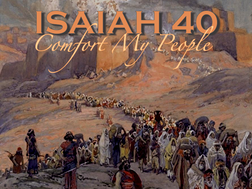 Chapter 40 introduces a new section of the prophecy of Isaiah. The first section (Chapters 1-35) contained prophecies concerning the divided kingdom of Judah and Israel and the surrounding nations. This was followed by the historical section focused on the impact of the Assyrian and Babylonian threats upon Hezekiah and the kingdom of Judah (Chapters 36-39). The next section is clearly Christo-centric (Chapters 40-66). It is sometimes called “The Book of Consolation” and can be divided into two subsections. The more looming concern (and more immediate and local focus) of the first section of prophecies is the Babylonian exile (in Chapters 40-55). The focus of the final section of prophecies (and more immediate and local application) is the return to Israel, with the kingdom of God and new heavens and new earth in view (56-66).
Chapter 40 introduces a new section of the prophecy of Isaiah. The first section (Chapters 1-35) contained prophecies concerning the divided kingdom of Judah and Israel and the surrounding nations. This was followed by the historical section focused on the impact of the Assyrian and Babylonian threats upon Hezekiah and the kingdom of Judah (Chapters 36-39). The next section is clearly Christo-centric (Chapters 40-66). It is sometimes called “The Book of Consolation” and can be divided into two subsections. The more looming concern (and more immediate and local focus) of the first section of prophecies is the Babylonian exile (in Chapters 40-55). The focus of the final section of prophecies (and more immediate and local application) is the return to Israel, with the kingdom of God and new heavens and new earth in view (56-66).
 Chapter 40 starts with a dramatic turn, a call to bring comfort to God’s people with good news. Truly our God is a God of all comfort (2 Corinthians 1:3). The word comfort means more than to provide sympathy. Its original meaning is ‘to fortify’ and ‘encourage.’
Chapter 40 starts with a dramatic turn, a call to bring comfort to God’s people with good news. Truly our God is a God of all comfort (2 Corinthians 1:3). The word comfort means more than to provide sympathy. Its original meaning is ‘to fortify’ and ‘encourage.’
Jesus is a comforter, and the Holy Spirit is ‘another comforter’ (John 14:16).
“Speak tenderly” means “Speak to the heart”.
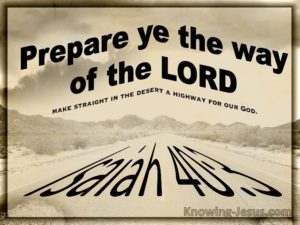 The New Testament begins with John the Baptist as a voice crying in the wilderness to prepare the way of the Lord. The gospel writer, Matthew, declares that John the Baptist is referred to in Isaiah 40:3 (Matthew 3:3).
The New Testament begins with John the Baptist as a voice crying in the wilderness to prepare the way of the Lord. The gospel writer, Matthew, declares that John the Baptist is referred to in Isaiah 40:3 (Matthew 3:3).
The good news is announced to God’s people that her warfare is ended. A full and lasting peace will be accomplished.
 The warfare between a holy God and sinful humanity is ended in the cross of Christ. Iniquities are pardoned in Christ. And a receipt in hand shall be given- the resurrection of Christ proves our sin debts have been paid in full. An invoice stating the amount owed is folded over and doubled as a receipt when paid in full. It is officially stamped “paid in full.” Jesus cried “Paid in full” (‘Tetelestai’ in the Greek) when He died on the cross to provide full atonement for our sins. “It is finished” (John 19:30).
The warfare between a holy God and sinful humanity is ended in the cross of Christ. Iniquities are pardoned in Christ. And a receipt in hand shall be given- the resurrection of Christ proves our sin debts have been paid in full. An invoice stating the amount owed is folded over and doubled as a receipt when paid in full. It is officially stamped “paid in full.” Jesus cried “Paid in full” (‘Tetelestai’ in the Greek) when He died on the cross to provide full atonement for our sins. “It is finished” (John 19:30).
The Messiah is coming. The good news of God’s deliverance in Christ needs to be announced, believed, and rested in.
There is no peace for the wicked, those who will not believe, but there is comfort and joy for those who do (Isaiah 48:22; 57:21; 41:16; 51:3,11; Luke 2:10).
What is the message to be cried out? First, the bad news. All have sinned (Romans 3:23). All flesh is as grass (Isaiah 40:6-8). The flesh profits nothing (John 6:63).
There is only one hope for humanity- the new birth through faith in the unfailing Word of God. Jesus is the fulfillment of this hope.
 Jesus said, “Heaven and earth will pass away, but My words will not pass away” (Matthew 24:35).
Jesus said, “Heaven and earth will pass away, but My words will not pass away” (Matthew 24:35).
Isaiah 40:8 8 The grass withers, the flower fades, But the word of our God stands forever.
Isaiah 40:9 9 Get yourself up on a high mountain, O Zion, bearer of good news, lift up your voice mightily, O Jerusalem, bearer of good news; Lift it up, do not fear. Say to the cities of Judah, “Here is your God!”
 Jesus, in effect, fulfills this prophecy, “He who has seen me has seen the Father” (John 14:9). “I and my Father are one” (John 10:30). “Behold your God!”
Jesus, in effect, fulfills this prophecy, “He who has seen me has seen the Father” (John 14:9). “I and my Father are one” (John 10:30). “Behold your God!”
He will tend His flock like a shepherd (Isaiah 40:11). Jesus said, “I am the good shepherd. The good shepherd lays down His life for the sheep” (John 10:11).
The greatness of God as Creator and His supremacy over all is extolled in verses 12-31.
In verses 18 and 25, Isaiah asks the rhetorical question: “To whom will you liken God?” He is incomparable. He sits above the circle of the earth (The prophet wasn’t a flat-earther! Isaiah 40:22). To Him, the nations are ‘a drop in the bucket’ (40:15), and the rulers of the earth are emptiness (40:23).
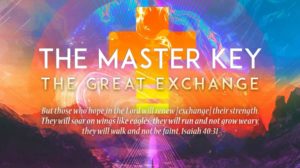 Both His omnipotence and tender mercy are described in Isaiah 40:28-31.
Both His omnipotence and tender mercy are described in Isaiah 40:28-31.
Isaiah 40:31 31 Yet those who wait for the LORD Will gain new (renew/exchange their) strength; They will mount up with wings like eagles, they will run and not get tired, they will walk and not become weary.
This is the gospel. Christ died for us, and as us, to live in us and for us. By trusting in His provision through the cross, we can accept our co-crucifixion, co-burial, co-resurrection, and co-ascension ‘in Him’. He gives us His Holy Spirit, a new life, His life. Through the cross, we have an exchanged life. Christ is our life (Colossians 3:3; Philippians 1:21; Galatians 2:20). Philippians 2:13 13 for it is God who is at work in you, both to will and to work for His good pleasure.
In Isaiah 41, the Lord continues to contrast His strength with man’s weakness. He gives His people the assurance that He is going before them and is working on their behalf. He tells his people to keep in silence and listen to Him (41:1).
The enemy that is approaching from the east (41:2-3), although powerful, is under God’s governing control. The people of Judah need not fear (41:10).
 Isaiah 41:4 4 “Who has performed and accomplished it, Calling forth the generations from the beginning? ‘I, the LORD, am the first, and with the last. I am He.'”
Isaiah 41:4 4 “Who has performed and accomplished it, Calling forth the generations from the beginning? ‘I, the LORD, am the first, and with the last. I am He.'”
This Divine Title of ‘the first and the last’, appears 8 times in the Bible and will apply to God the Father and Jesus Christ His Son (Isaiah 41:4, 44:6; 48:12; Revelation 1:8, 1:17, 2:8; 21:16, 22:13).
This section (Isaiah 41:8-20) has to do with Israel. In verse 8, Israel is called “My Servant”. Later this title will be applied to the Messiah.
Fear is faith in reverse. If His people will trust in Him, they need not fear.
Isaiah 41:10 10 ‘Do not fear, for I am with you; Do not anxiously look about you, for I am your God. I will strengthen you, surely I will help you, Surely I will uphold you with My righteous right hand.’
He repeats the promise again in verse 13.
Isaiah 41:13 13 “For I am the LORD your God, who upholds your right hand, Who says to you, ‘Do not fear, I will help you.’
In the New Testament, James will reference verse 8 when he writes about Abraham. We know we have a friend in Jesus, but what a wonderful thing it is for God to call Abraham, His “friend”.
Israel will be used as God’s instrument to proclaim the gospel message to the nations, a message that will have ‘teeth’ in it.
Isaiah 41:15 15 “Behold, I have made you a new, sharp threshing sledge with double edges; You will thresh the mountains and pulverize them, and will make the hills like chaff.
Every mountain would be made low (Isaiah 40:4) as people are put on the even ground of repentance at the foot of the cross.
TODAY’S READING FROM THE NEW TESTAMENT – EPHESIANS 1:1-23
 The Book of Ephesians has been called the Mt. Everest of the New Testament, as it takes us to the highest heights where we see how God positions the believer far above principalities and powers in the heavenly places, at the right hand of the Father, ‘in Christ Jesus’.
The Book of Ephesians has been called the Mt. Everest of the New Testament, as it takes us to the highest heights where we see how God positions the believer far above principalities and powers in the heavenly places, at the right hand of the Father, ‘in Christ Jesus’.
If you, as a gospel believer, have any questions as to your true identity, where you are positioned in the mind and affections of God the Father, and Who You are in the mind and affections of the Son, you will find the answers in the Book of Ephesians. It is a wonderful book that teaches us who we are in Christ, where we are going, and how we are to live along the way.
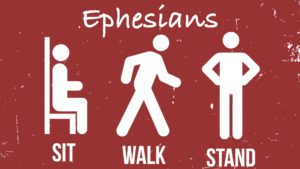 Chapters 1-3 have to do with our position of rest in the perfect work of Jesus Christ, seated above in the heavenly places. It is a call to “SIT”. We put our faith in what God says about our identity and position ‘in Christ’.
Chapters 1-3 have to do with our position of rest in the perfect work of Jesus Christ, seated above in the heavenly places. It is a call to “SIT”. We put our faith in what God says about our identity and position ‘in Christ’.
Chapters 4-5 have to do with the outliving of the Indwelling Christ, with clear directives of how we are to live our lives in the Spirit. It is a call to “WALK”. We exercise faith as we live lives that are pleasing to Christ.
Chapter 6 reminds us that we are in a spiritual battle but have been given spiritual resources as the body of Christ to be victorious as we identify with the victory of Christ. It is a call to “STAND”.
In Chapter 1 we recognize that Christians are addressed as ‘saints’ and ‘faithful’ in Christ Jesus (1:1).
Paul starts with his praise. He gives glory to the Tri-Une God for who He is and what He has done for us.
Verses 3-6 contain his praise given to the glory and grace of the Father. For He has blessed us in Christ, chosen us in Christ to be holy, predestined us to be adopted,
Ephesians 1:6 6 to the praise of the glory of His grace, which He freely bestowed on us in the Beloved.
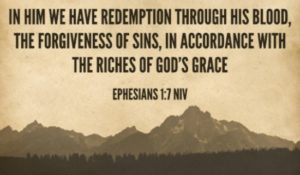 Verses 7-12 contain his praise given to the glory and grace of the Son.
Verses 7-12 contain his praise given to the glory and grace of the Son.
In Him we have redemption, forgiveness, wisdom and understanding, and an inheritance in His kingdom, in which He is the sum of all things.
Ephesians 1:12 12 to the end that we who were the first to hope in Christ would be to the praise of His glory.
Verses 13-14 express his praise given to the glory of the Holy Spirit. The Spirit plays an indispensable role in our conversion by activating the proclamation, hearing, receiving, and the believing of the gospel truth in our hearts. He seals us in a vital union with the Father and the Son. He blesses us with His Indwelling presence as a down payment of God’s pledge to give us our full inheritance in Christ. He marks us as belonging exclusively to Him, “to the praise of His glory”.
Verses 15-23 contain his prayer, yet this prayer morphs into a rich deposit of revelatory teaching given to the church that will continue through the remaining chapters.
He gives thanks for their faith and miraculous love. It is through their faith in Christ that they have love for God and for ALL their brothers and sisters in His church.
Paul’s prayer is that they may know God better, Father, Son, and Holy Spirit.
He prays that they will know the hope to which God has called them. You may know what you have been saved from, but do you know what you have been saved to? (1:18a)
He prays that they might know how He sees the church. The church contains the riches of Christ’s inheritance. It is something He treasures (1:18b).
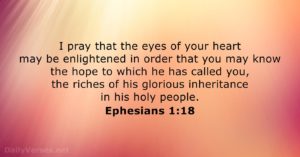 He prays that we might know the exceeding greatness of His resurrection power by which our salvation has been, and is being, accomplished!
He prays that we might know the exceeding greatness of His resurrection power by which our salvation has been, and is being, accomplished!
By virtue of Christ’s resurrection and ascension, God has made Him to be head over all things to the church, which is His body, the fullness of Him that fills all in all.
How can we know God better and perceive the truth of all these wonderful things, such as the reality of the church as the body of Christ? Paul explains in verses 17 and 18 that it is by the Spirit of wisdom and of revelation in the knowledge of Christ that we will have the eyes of our heart’s understanding enlightened to perceive the truth about Who God is, who we are, and what we are called to do ‘in Him’.
TODAY’S READING FROM THE BOOK OF PSALMS – PSALM 66:1-20
 This is another psalm of praise. It has two parts. The first part has to do with their national story (v.1-12), where they celebrate their Divine Deliverance from trouble. They realize that the trouble itself was the Divine Method of chastisement to bring them to ‘a place of abundance’ (v.12).
This is another psalm of praise. It has two parts. The first part has to do with their national story (v.1-12), where they celebrate their Divine Deliverance from trouble. They realize that the trouble itself was the Divine Method of chastisement to bring them to ‘a place of abundance’ (v.12).
The second section has to do with the Psalmist’s personal story. In his days of distress, he made his vows to the Lord. Now in the days of prosperity, he recalls them and resolves to go to the house of the Lord with the sacrifices of burnt offerings required. Voluntary vows like this are not necessary, but if they are made, we should not try to escape them unless they are considered foolish.
In verses 1-4, the Psalmist calls us to ‘come and sing, shout, and speak’ praise to God for His awesome deeds.
In verses 5-7, he calls us to ‘come and see’ what God has done in delivering us from the sentence of death. Passing over ‘on dry ground’ (think Red Sea and Jordan River) is a constant image picturing ‘salvation’ in the Bible.
In verses 8-12, there is a call to testify of His saving grace corporately as the people of God.
Verses 13-15, the Psalmist expresses worship through his obedience. He resolves to fulfill his promises, his vows, and bring the burnt offerings of sacrifice he voluntarily pledged.
Paul gives a New Testament application:
Romans 12:1-2 1 Therefore I urge you, brethren, by the mercies of God, to present your bodies a living and holy sacrifice, acceptable to God, which is your spiritual service of worship. 2 And do not be conformed to this world, but be transformed by the renewing of your mind, so that you may prove what the will of God is, that which is good and acceptable and perfect.
TODAY’S READING FROM THE BOOK OF PROVERBS – PROVERBS 23:26-28
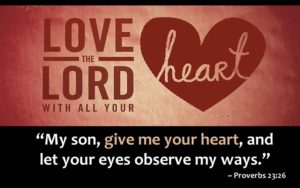 Proverbs 23:26-28 26 Give me your heart, my son, and let your eyes delight in my ways. 27 For a harlot is a deep pit and an adulterous woman is a narrow well. 28 Surely she lurks as a robber, and increases the faithless among men.
Proverbs 23:26-28 26 Give me your heart, my son, and let your eyes delight in my ways. 27 For a harlot is a deep pit and an adulterous woman is a narrow well. 28 Surely she lurks as a robber, and increases the faithless among men.
In asking for our heart, God is asking for our fullest surrender, our fullest trust, our fullest devotion, our fullest attention, and our fullest obedience.
We are betrothed to Christ. We cannot allow ourselves to be seduced by false lovers, who are only harlots that draw us to our own destruction, and the destruction of those around us.
PRAY FOR THE NATIONS – CONTINUED PRAYER FOR NIGERIA
(see pages p. 645 to 652 of the Operation World Prayer Guide for insights for intercession on the various zones and states of Nigeria).
PRAYER: God of all comfort, we thank You for fortifying us with Your Word. We offer You our praise with singing, shouting, speaking, and most importantly, by surrendering our lives before You with our fullest devotion, obedience, and trust. You are the same yesterday, today, and forever. You are the first and the last, the Eternal God, our all and in all. In You, we find complete satisfaction. Our prayer is that by the Spirit of wisdom and of revelation in the knowledge of Christ, we might come to know You better and the reality of our heavenly position and our earthly privilege as members of the body of Christ. Help us to live out our lives in the power of the Holy Spirit to the praise of Your glory and grace. In Jesus’ Name. Amen.
